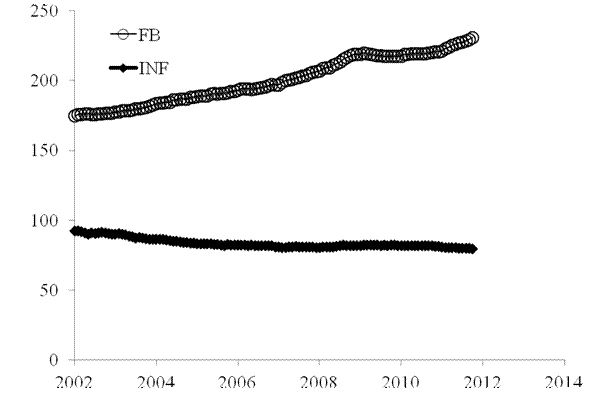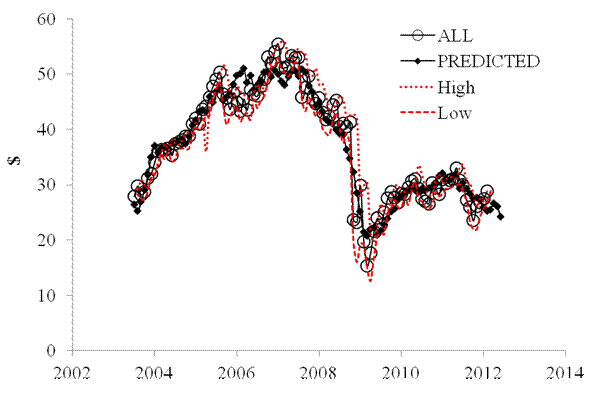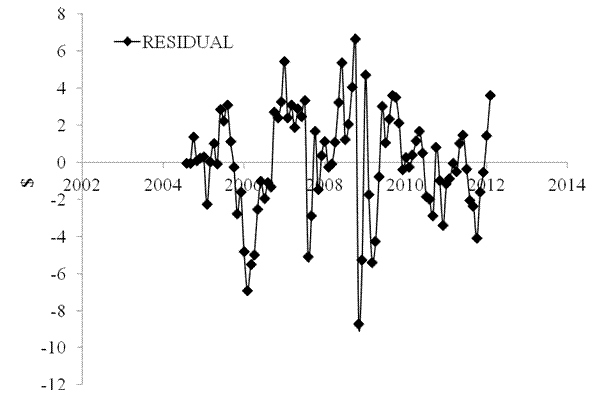Here we model the evolution of Allstate Corporation’s (NYSE: ALL) stock price. Allstate is a company from financial sector which is associated with “the personal property and casualty insurance, life insurance, and retirement and investment products business primarily in the United States”. The model has been obtained using our concept of share pricing as a decomposition of a share price into a weighted sum of two consumer price indices. The background idea is a simplistic one: there is a potential trade-off between a given share price and goods and services the company produces and/or provides. For example, the energy consumer price does influence the price of energy companies. It should be taken into account that the defining consumer price (or relevant CPI) has to be related to some independent and dynamic reference, which can also be a consumer price index. A higher relative growth of the defining CPI should be manifested in a higher pricing power for the company.
We have borrowed the time series of monthly closing prices of ALL from Yahoo.com and the relevant (seasonally not adjusted) CPI estimates through January 2012 are published by the BLS. The evolution of ALL share price is defined by the consumer price index of food without beverages (FB) and the index of information and information processing (INF). The defining time lags are as follows: the FB index leads the share price by 4 months and the INF index leads by 6 months. The relevant best-fit model for ALL(t) is as follows:
ALL(t) = -1.83FB(t-4) – 4.05INF(t-6) + 6.21(t-1990) + 634.40, February 2012
where ALL(t) is the ALL share price in U.S. dollars, t is calendar time. Figure 1 displays the evolution of both defining indices since 2002. Figure 2 depicts the high and low monthly prices for an ALL share together with the predicted and measured monthly closing prices (adjusted for dividends and splits). The predicted prices are well within the bounds of the share price uncertainty and lead by 4 months.
The model residual error is shown in Figure 3 with the standard deviation between July 2003 and January 2012 of $2.74.
One can foresee the price evolution at a 4 months horizon. Currently, the share price is expected to decline in the first half of 2012. 
Figure 1. The evolution of FB and INF indices 
Figure 2. Observed and predicted ALL share prices.
Figure 3. The model residual error: stdev=$2.74.
- English (UK)
- English (India)
- English (Canada)
- English (Australia)
- English (South Africa)
- English (Philippines)
- English (Nigeria)
- Deutsch
- Español (España)
- Español (México)
- Français
- Italiano
- Nederlands
- Português (Portugal)
- Polski
- Português (Brasil)
- Русский
- Türkçe
- العربية
- Ελληνικά
- Svenska
- Suomi
- עברית
- 日本語
- 한국어
- 简体中文
- 繁體中文
- Bahasa Indonesia
- Bahasa Melayu
- ไทย
- Tiếng Việt
- हिंदी
Allstate Corporation's Share Price
Published 03/04/2012, 12:51 AM
Updated 07/09/2023, 06:31 AM
Allstate Corporation's Share Price
Latest comments
Loading next article…
Install Our App
Risk Disclosure: Trading in financial instruments and/or cryptocurrencies involves high risks including the risk of losing some, or all, of your investment amount, and may not be suitable for all investors. Prices of cryptocurrencies are extremely volatile and may be affected by external factors such as financial, regulatory or political events. Trading on margin increases the financial risks.
Before deciding to trade in financial instrument or cryptocurrencies you should be fully informed of the risks and costs associated with trading the financial markets, carefully consider your investment objectives, level of experience, and risk appetite, and seek professional advice where needed.
Fusion Media would like to remind you that the data contained in this website is not necessarily real-time nor accurate. The data and prices on the website are not necessarily provided by any market or exchange, but may be provided by market makers, and so prices may not be accurate and may differ from the actual price at any given market, meaning prices are indicative and not appropriate for trading purposes. Fusion Media and any provider of the data contained in this website will not accept liability for any loss or damage as a result of your trading, or your reliance on the information contained within this website.
It is prohibited to use, store, reproduce, display, modify, transmit or distribute the data contained in this website without the explicit prior written permission of Fusion Media and/or the data provider. All intellectual property rights are reserved by the providers and/or the exchange providing the data contained in this website.
Fusion Media may be compensated by the advertisers that appear on the website, based on your interaction with the advertisements or advertisers.
Before deciding to trade in financial instrument or cryptocurrencies you should be fully informed of the risks and costs associated with trading the financial markets, carefully consider your investment objectives, level of experience, and risk appetite, and seek professional advice where needed.
Fusion Media would like to remind you that the data contained in this website is not necessarily real-time nor accurate. The data and prices on the website are not necessarily provided by any market or exchange, but may be provided by market makers, and so prices may not be accurate and may differ from the actual price at any given market, meaning prices are indicative and not appropriate for trading purposes. Fusion Media and any provider of the data contained in this website will not accept liability for any loss or damage as a result of your trading, or your reliance on the information contained within this website.
It is prohibited to use, store, reproduce, display, modify, transmit or distribute the data contained in this website without the explicit prior written permission of Fusion Media and/or the data provider. All intellectual property rights are reserved by the providers and/or the exchange providing the data contained in this website.
Fusion Media may be compensated by the advertisers that appear on the website, based on your interaction with the advertisements or advertisers.
© 2007-2025 - Fusion Media Limited. All Rights Reserved.
